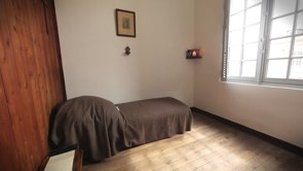"Next, each one of you is to have a separate cell, situated as the lie of the land you propose to
occupy may dictate, and allotted by disposition of the Prior with the agreement of the other brothers,
or the mature among them."
occupy may dictate, and allotted by disposition of the Prior with the agreement of the other brothers,
or the mature among them."

We are to each have a “separate” cell. This does not simply mean that we each have an individual room, with individual doors. The cell is not a room, but a place of intimacy, an encounter where we can spend time, not merely sleeping; in retreat from others so that we can watch our tv show or listen to our favorite music; sitting at our writing desk or finding a quiet place to read a book; it is a place where we spend dwelling in union with out Beloved. If we are paying attention, the cell is not even specified to be a single room. Perhaps tradition has interpreted it as such, and that tradition is meaningful, but what is most meaningful is that the cell is a “separate” place where we do not simply go, but in which we live and spend time with God, actively and privately. This quality means two things.
First, we must be able to have that active and participative union with with God. Our cells are not to become private living quarters (or our personal condos as I have heard some brothers describe them). They are to be centers of prayer and must provide sufficient room (i.e. space) and means to engage in this prayer actively.
Second, and more importantly, a “separate” cell means that one is free from outside influences. This does not mean just having its own door, or only one bed to each cell, but that what I am doing in my cell should neither interfere with, nor influence any other brother’s cell. A “separate” cell includes the separation of sounds, that our cells have sufficient room between them, or that the walls at least are built to provide privacy. One brother not only should be able to pray vocally and aloud (i.e. actively), without worry over disturbing his neighbor, but should always have the cell as a place of silence. The cell must always be that one place to which we may go in order to find the silence and preserve the undying unity and intimacy with our Beloved.
It is understandable that there are limits to what can be done to insulate rooms in a house, and to what is possible in a given house; this is given and understood in the Rule, that the cells be situated as the “lie of the land” dictates. For some houses it is essentially impossible to grant each brother a cell that is fully separate from the others. When this is the case, it remains that our attention should remain on putting forth every effort to create a “separation” between the cells and that this “separation” includes much more than merely granting individual rooms.
Second, and more importantly, a “separate” cell means that one is free from outside influences. This does not mean just having its own door, or only one bed to each cell, but that what I am doing in my cell should neither interfere with, nor influence any other brother’s cell. A “separate” cell includes the separation of sounds, that our cells have sufficient room between them, or that the walls at least are built to provide privacy. One brother not only should be able to pray vocally and aloud (i.e. actively), without worry over disturbing his neighbor, but should always have the cell as a place of silence. The cell must always be that one place to which we may go in order to find the silence and preserve the undying unity and intimacy with our Beloved.
It is understandable that there are limits to what can be done to insulate rooms in a house, and to what is possible in a given house; this is given and understood in the Rule, that the cells be situated as the “lie of the land” dictates. For some houses it is essentially impossible to grant each brother a cell that is fully separate from the others. When this is the case, it remains that our attention should remain on putting forth every effort to create a “separation” between the cells and that this “separation” includes much more than merely granting individual rooms.

 RSS Feed
RSS Feed